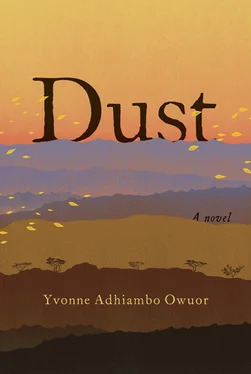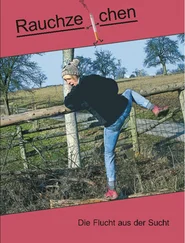A pink haze over the land lit up their room. Selene woke up in tears. Hugh was sleeping faceup. He had raised his left knee. Selene studied his naked body. Seamlessly brown, as if the sun had delicately turned him on a spit over its fires.
Till death do us part .
Which death? Many kinds on offer here.
She moved so that she was on top of Hugh. He opened his eyes and smiled a lopsided smile, tightened his arms around her. She lowered her head, her hair covering his face. Memories of another couple named Selene and Hugh nestling in each other’s arms, people from a Pleistocene epoch, far away from the Selene and Hugh they had since become. She tasted his sweat. The scars on his chest, on his head. The chest hair. Rubbed her face against his stubble, inhaling silent lines of too many hidden stories. Scratches, bites, bullet wound, the faint mark of a garrote beneath his chin.
She should have asked the questions. Who is she? Painter hands, hard, elongated, denuded of excess fat. Who are you? Open-mouthed breathing. Who is she? Her tongue hunted the Hugh she remembered. He was there. He was there. Who is she? A long kiss made of grief. Hugh moved his body so she was under him. He bit her nose, half in jest, stroked her leg. Selene moaned instead. Hated the memory of buzzing blue flies. How could she live with these flies? Hated Hugh. Loved Hugh. Craved Hugh. Arched into Hugh, who used to gasp but now grunted. She placed his hands around her neck and squeezed. Soft. Gentle. Loving. Loathing. Tears.
She did not know how long Hugh had been watching her. He touched her sweating body. She turned to him, her face unmasked. He kissed her mouth. He whispered, “You don’t like it here.”
Hugh’s disappointment scalded Selene’s soul. She knelt, reaching down him, fingers fluttering, touching his face. Willing to forgive and forget everything. “Let’s go home, let’s go back home.”
Hugh played with her hair. “We are home, darling.”
She left the Northern Frontier District.
She left alone.

Almost a year later, volcanic shifts within Selene were interspersed with the outside rising babble of new-Kenya tunes: “Kenya, Kenya, Kenya nchi yetu … wapi wale wabeberu waone haya …” Gloating hymns overpowered her, their deafness to intimate losses, as if she had no right to desire, as if the years of work and ash-strewn dreams meant nothing, as if she had not struggled to love this land even though it had tried to take everything from her. A secret. In the darkness she had seized something from it, and now, like a jewel thief, she was fleeing the scene of her heist. Destination England. To save a life, to have a life.
Unease .
The baby moved. She shielded her stomach, exhaled, and then smiled a mother’s smile.
IN THE MORNING, AFTER AJANY STAGGERED BACK INTO WUOTH Ogik from the caves, she saw gold-and-red daylight on stone. She lurched to the edge of her brother’s half-finished grave, sniffed the putrid smell of dying, and jumped in.
Light swathes. It warms her skin. She clambers out to stand near her brother. Contemplates the gray, placid face inside the coffin. Its stillness and absence are a new palette. She knows how to paint with darkness. She knows shadows, too. Absence is new. She must chase after it until it takes her to Odidi’s Somewhere Else.
Shadows shift.
Ajany pushes open the doors of the falling coral house. Hearing the sound, Galgalu hobbles in, fingers knuckled against his chest where it throbs. He starts when he finds Ajany staring at family pictures. “Ch’uquliisa?” he whispers, fingering the amethyst she had given him.
She is wiping the picture frames.
Galgalu takes Ajany’s blood-streaked palms and turns them over, touches entangled hair, smells sweat, rot, and coldness. There is brightness in her eyes, and her body thrums. She had turned herself over to something. Madness? Galgalu trembles.
“ ’Galu,” Ajany says as if in a dream, “tell … Baba I’ve gone to find Odidi.”
Galgalu mutters, “Remember the moon.” Ajany stares. Galgalu says, “It falls to pieces. It becomes whole again.”
She hears his words in patches.
Galgalu tiptoes out of the room pulled apart by two desires, to seize Ajany and shake her back to lucidity, and to protect Nyipir from this, the image and likeness of lunacy. If a man has nothing to live for …
Akai Lokorijom had not come home yet.
Galgalu pinches his chin, then twists the amethyst this way and that. He must return to the Trader. There was a formula for exorcising everything. The Trader always said so.
Ajany pulls out clothes from her still-packed bag until she can carry it with one hand. She places Hugh’s painting in the library for Isaiah to find. Nothing to do with her now.
Wind-marked solitude. A goatskin water bag. Ajany’s orange carry-on swings in counterpoint to her steps. She scans the earth for signs of water, wells, damp soil, mud, dew-storing stones, and scraggly grass. Mount Kulal — the storykeeper of this land. She listens for songs of the terrain that Odidi would have been singing by now.
He had started it, Odidi had. Their homelessness. He had conjured up stories of Elsewhere — imagined siblings, aunties, uncles, cousins, and grandparents, a web of doting dream relations into which he and Ajany inserted their longing to leave. Those relatives never did come.
Ajany walks over scallops molded into a black, pimply earth. Her stride lengthens. A view of mountains shaped like music notations, and six cairns. She crosses two lagas , gawks where foreigners have planted a forest of white windmills, implants in a land made for silence. There are other strangers elsewhere building giant rigs, prospecting for oil in margins without a sound.
Blue sky. Memory of cattle drives across this land to markets and to jilali safe pasture. Toward Turbi, distances and destiny. Heat, dust, and hope; murmurs and songs; whistling, laughter, and spare words. The last time they had walked she had been ten, still sucked her two fingers, and lurked in Odidi’s shadows. Not wanting to be left behind with Akai-ma, she had sneaked after Galgalu, Nyipir, and Odidi after they had left with the cattle for sale. Galgalu knew she was in the shadow of their trail, but he had not given her away. She showed herself after two and a half days.
Baba had frowned down at her. Then he sighed and asked, “Akai-ma?”
Ajany had looked back at Nyipir, as unworried as a favorite cat, while Odidi made throat-cutting gestures at her behind his father’s back.
“What do I do?” Nyipir’s brow had gone up.
Nothing , she hoped.
Nyipir contemplated her.
He nodded.
They resumed their trek. Odidi moved close to pull her hair. “Olwenda,” he hissed.
So what if she was a cockroach? She stuck her tongue out at him. “Baba,” Odidi announced, “everyone does their share of work.”
Nyipir looked over his shoulder at Ajany.
She smiled at him. He laughed, stooped so she could ride on his shoulders in their northward journey.
“Olwenda!” mouthed Odidi.
She stuck fingers into her mouth, stretched it, and crossed her eyes at him.
Ajany learned from Galgalu how to bind the camels’ feet; she milked the camels and mimicked him as he murmured to the animals’ secret anxieties. At night, under the stars, Odidi, whose stomach served as her pillow, showed her Kormamaddo, the camel of the skies, and as he did, she knew she was as safe as a seed enclosed in a warm, thick pod.
The Turbi market. Even now she remembered the smell of moneymaking, life’s tensions abandoned to bargaining in an exchange of wit and energy. Trust extended. Wall Street heated up, and the commodities bleated. They left with a well-bred Boran bull, probably rustled off someone’s farm, five top-grade cows, two Somali camels, and four Rendille camels, placed on a lorry and driven to Wuoth Ogik. When they returned to the ranch fifteen days later, Akai-ma did not scold. She seemed not to have noticed that Ajany had gone. They quarantined the new animals. Later, the men branded them with the  family sign before introducing the newcomers to the family herd.
family sign before introducing the newcomers to the family herd.
Читать дальше


 family sign before introducing the newcomers to the family herd.
family sign before introducing the newcomers to the family herd.









